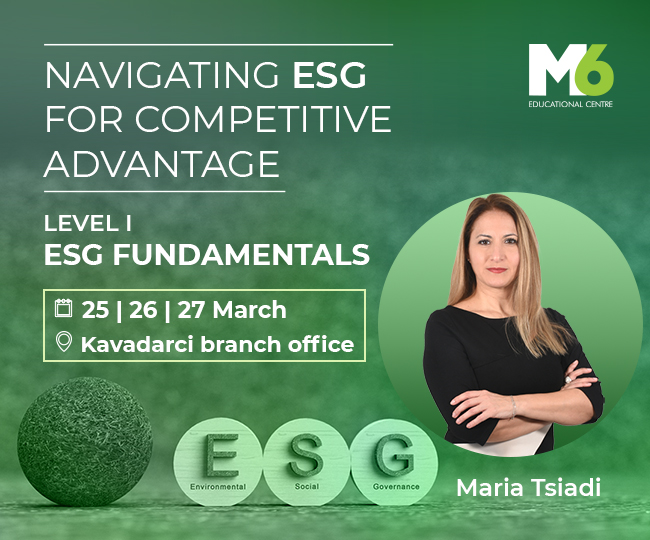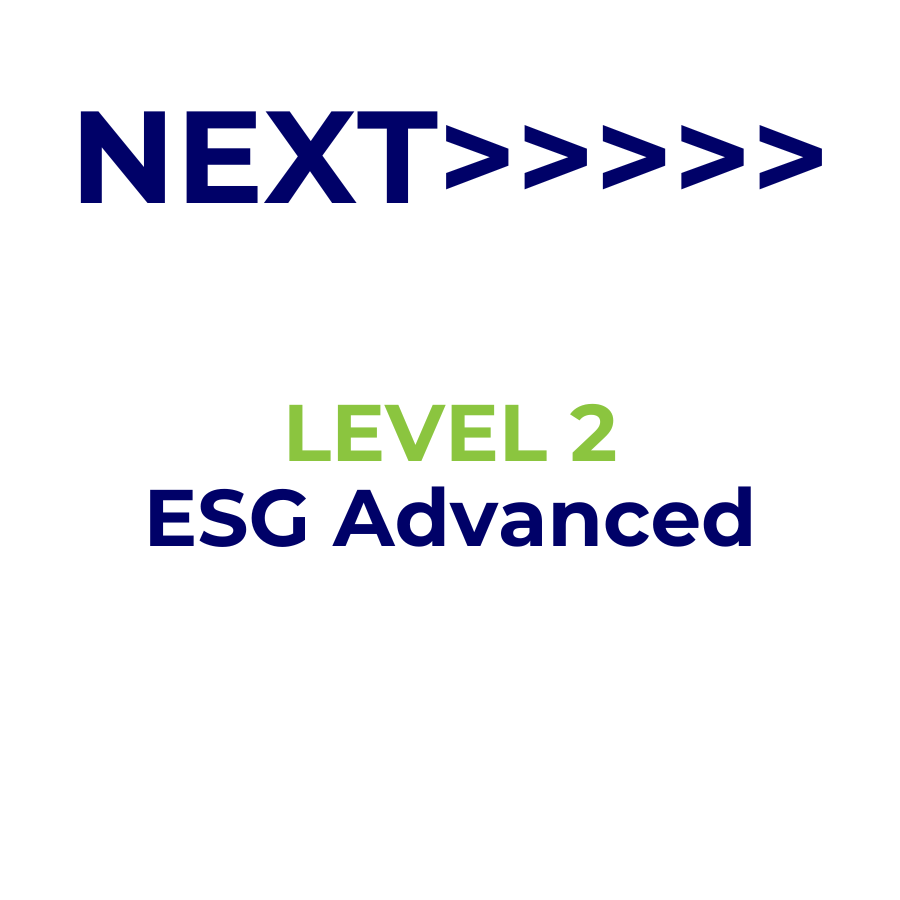

As sustainability and responsible business practices become integral to long-term success, executive leaders need to understand how to navigate and implement effective Environmental, Social, and Governance (ESG) strategies. The purpose of the training program is to educate executives on the concepts of sustainability, corporate social responsibility and ESG criteria, so as to understand these concepts, distinguish between them and choose the right strategy development model for the organization or business they own or works at.

Executives will gain practical skills to assess their organization’s current position, develop actionable sustainability strategies, and lead with a vision for long-term impact. After the training, the trainees will be able to understand: The differences between sustainability, sustainable development, corporate social responsibility and ESG criteria. The different ESG frameworks. The structure that a relevant report should have, including Stakeholder Engagement, Double Materiality Analysis, Risk Management. The data required to be collected and for what reason Good and bad practices.
The objectives of the training are:
– To educate the enterprises on the importance of ESG and the implications of the new regulations to
their operations
– To inspire the enterprises to invest in ESG strategies and implementation actions to advance in the
global business environment
– The training, and the relative material must adhere to modern design and learning criteria and must
be easy to understand, user friendly and interactive
• The Training is designed in 2 modules with 6 days duration: Fundamentals and Advanced
• Each module lasts for 3 days
• International expert as a trainer
• Guest speakers (from the practice)
• Practical lessons & Real-Case studies
• Optional – CERTIFICATE from TUV Austria for participants on both levels
Course Overview
- ESG concepts and impact:
- ESG as a strategic business partner
- The role of ESG in Risk Management and value creation
- ESG reporting frameworks
- Overview of major reporting frameworks (GRI, CSRD,
SASB, TCFD etc) - Integrating ESG into financial reporting
- Overview of major reporting frameworks (GRI, CSRD,
- ESG in North Macedonia
- ESG/Sustainability for Corporations/SMEs
- Corporate Governance Regulation
- Non-Financial Reporting Regulations, National Bank of
N.Macedonia, Macedonian Stock Exchange regulations
- Stakeholder Engagement
- Stakeholder Engagement Definition and Strategies
- Understanding and Managing Conflicts
- Measuring Stakeholder Engagement success
- Case studies
- ESG integration into business strategy
- Aligning ESG with the overall business strategy
- Long term value creation through ESG integration in
practice - Creating a culture of sustainability
- Using ESG to drive innovation and competitiveness
- Who is to run ESG in a corporation
- The pillars of E.S.G. analyzed
- Energy and Carbon Management
- Waste management and Circular Economy
- Biodiversity
- Employee Well Being and Diversity
- Ethical Supply Chain Management
- Corporate Governance Essentials
Course Overview
Environmental Pillar
Carbon Neutrality and Negative Emissions
- Explanation
- Overview of cutting – edge technologies
Carbon Markets and Trading
- Exploration of carbon markets, cap-and-trade systems
- Understanding challenges and opportunities
Carbon reduction in supply chains
- ETS and CBAM effects
- Strategies for implementing carbon reduction measures in complex supply chains.
Advanced Waste Management
- Waste to energy, chemical recycling, smart waste
- systems
- Advanced metrics for measuring circularity
- Life Cycle Assessments and Carbon Footprint Reduction
Biodiversity : the new reporting challenge
Social Pillar
Employee wellbeing and diversity & inclusion
- Promoting diversity & inclusion
- Employee health and safety, wellbeing principles
Human rights and labor rights
- Understanding Human Rights in business operations
- Addressing Human Rights violations
Ethical Supply Chain management
- Supply Chain Due Diligence
- CSDDD implications to all businesses
- ETS and CBAM effects on international value chains
- Collaborative approach to ethical sourcing
Social Responsibility in business
- From CSR to CSV
- Social issues in the business context
Double Materiality Concept – Governance Pillar
The concept of Double Materiality
- Integrating Financial and Non-Financial considerations
- Regulatory landscape (ESRS, TCFD, SASB) and emerging trends
Quantifying Environmental and Social Impacts
- Methods for measuring and assessing environmental impacts
- Social impact indicators and measurement tools
Risk Management in the concept of Double Materiality
- Identifying and categorizing ESG Risks
- Frameworks for risk management
- TCFD recommendations and climate –related risks
- ISO 31000 and its applicability to ESG risk management
Stress testing ESG resilience
- Evaluating the resilience of the business model to extreme climate scenarios
- Developing Stress testing frameworks for ESG factors
Meet the Trainer
 Maria Tsiadi, Senior ESG Consultant
Maria Tsiadi, Senior ESG Consultant
Maria Tsiadi is an executive with long experience in the FMCG and technology industry, specialized
in Sustainability, Public Affairs and CSR. She has extensive experience in developing strategic business
plans and sustainability strategies and reports. Her professional activity includes participation in
managerial positions in large organizations such as Sony Hellas, Gr. Sarantis S.A. and Chicco.
In recent years Maria has created Strategies and Sustainability Reports for large companies and
organizations such as PPC Group, EYDAP, Papadopoulou, Growth Fund of Greece, Papastratos
(subsidiary of PMI) a.o. She executes training programs on ESG topics (Elval Halcor, Alpha Bank,
Papastratos a.o.)
Maria leads projects in sustainable finance, strategy, non-financial reporting, sustainability activities,
ESG performance and recognition through indices, awards and initiatives. She speaks at international
and local events as an ESG expert.
She holds a MSc Degree in Public Relations from Stirling University, a BA in Business Administration
and Marketing, a GRI Standards Certification, Risk Management Certification from TUV Austria, and
currently attends the Master’s in Governance and Human Rights at Leuphana University Lüneburg.
She speaks Greek, English and Italian.
Price
ESG LEVEL I
24.800MKD
ESG LEVEL II
24.800MKD
Location – M6 Educational Centre Kavadarci
Time: 09:00 – 16:00h
This activity is co-financed by M6 Educational Centre and the Government of Switzerland through the Swiss project “Education for Employment” – E4E@mk implemented by Helvetas.
Have any questions regarding the course? Reach out using the form below!
Testimonial































